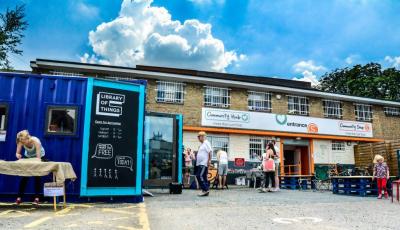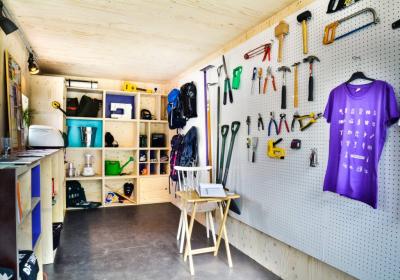

by Alanna Ketler, Collective Evolution
We’ve all felt this frustration: We need a specific item, be it a tool, a ladder, or a tent, and have to go out and buy it, then store it in our homes, despite only needing it one time. Not only is this kind of purchase costly, it contributes to unnecessary consumerism. We probably have many of the exact same things as our neighbours do, and our houses and apartments are full of stuff that we hardly ever use — talk about wasteful!
To take this even further, just imagine all of the resources that are required to not only make these things that we hardly ever use, but also to transport and package them. It all seems a little silly, doesn’t it? The obvious solution might be to ask a neighbour to borrow the item, but many of us are uncomfortable with both knocking on strangers’ doors asking for help and with opening our own to people we don’t know.
What if there were a place where we could go to borrow these things, which we only need temporarily, and then return them for others to use when they find themselves in a similar situation? Well, there is! Enter the Library of Things, a simple solution to occasional needs that reflects the shift that is occurring in our society, as people are leaning more and more toward the idea of sharing, community, and helping one another, and away from selfishness and materialism.
What Is a Library Of Things?
It’s exactly what it sounds like: a library for items such as tools, shovels, camping supplies, carpet cleaners, and more. As with a regular library, you must have a membership, which allows you to check out the required item (or items) and bring it back within a certain timeframe. I don’t know about you, but I can’t help but wonder how we never thought of this before. Just think of the amount of materials, time, and money we could have saved had we been borrowing rather than buying all along!
Just last year, a Library of Things opened in Toronto, aptly named the The Sharing Depot. What started out as a library of tools grew into a library with a wide range of items. The mission of The Sharing Depot is to challenge a culture that has become obsessed with ownership, with always having and needing more, all so we can define ourselves with the possessions we own. Co-founder Lawrence Alvarez writes, “The Earth cannot afford for all of us to own it all.” It’s completely unsustainable for us all to own items that we rarely use.

A Library of Things has the added benefit of saving people money, and it also allows for people with limited resources to enjoy experiences they wouldn’t otherwise have access to, such as board games for children, tools for home renovation, or perhaps a kayak for the adventure-seeking spirit.
These libraries help to build and strengthen communities by not only lending just things, but also knowledge, ideas, and skills — like how to fix broken items, for example, instead of just throwing them away and buying replacements.
“People should stop buying things they don’t always need,” said co-founder Ryan Dyment. “The idea of a circular economy is for more people to lease things rather than own them. That’s the future that I think is practical.”
Moving forward, these libraries could partner up with companies who design their products with longevity in mind, and offer products that are durable and designed to be reused and shared. Perhaps these libraries could invest in items from this website, which only sells products that are guaranteed to last.
What Is the Cost?
This is entirely dependent on each library, but typically they charge an annual membership fee of around $25-$100, depending on the type of membership you choose — some offer access to longer borrowing periods or more costly items, for instance.
How Can You Start a Library Of Things in Your Community?
If you wish there were something like this in your own community, consider making it your job to spread the word and put together your own library of things in your neighbourhood. Reach out to any groups that may already be doing something similar and join forces or learn from them. Talk about the idea with your friends and family, and chances are you’ll be getting a team together in no time.
As this is something that is geared toward reducing consumption and waste, while helping out those in need in various ways, you may qualify for funding from local government and community foundations. This can also help you acquire enough things to start your library, through donation.
There are many more resources available online from other libraries that have their own tips, tricks, and advice for how to get started. Check out this one.
Conclusion
This idea could revolutionize many aspects of the world, and we all stand to benefit, including our planet. What an awesome idea!
Much Love
http://www.collective-evolution.com/2017/02/24/can-a-library-of-things-solve-our-peak-stuff-problem/

